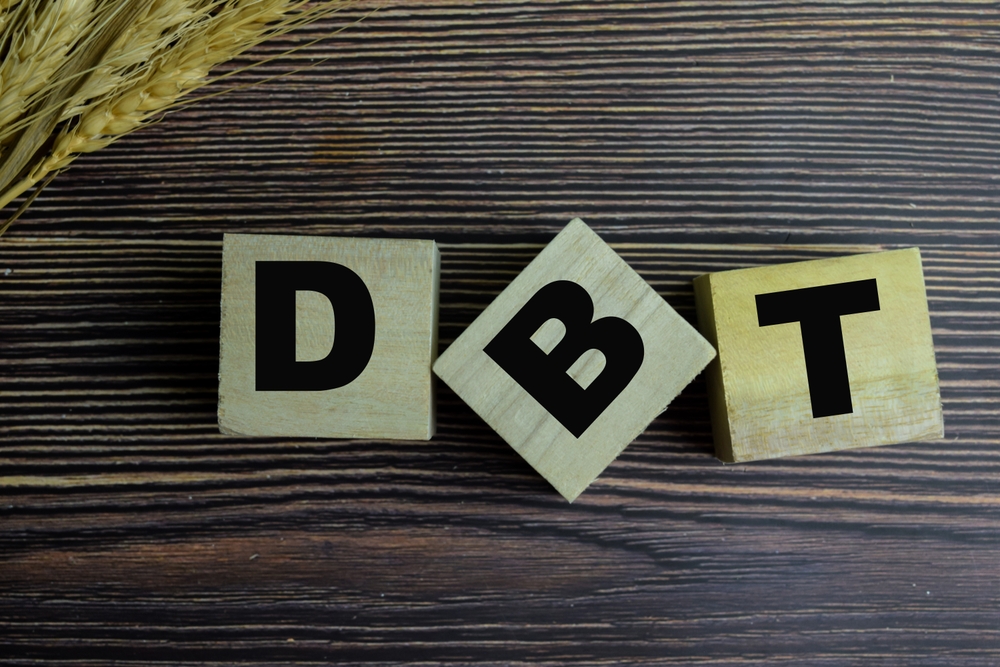
Written by:
Last Updated:
August 13th, 2025
Dialectical Behavioural Therapy | | Benefits and How it is Implemented
Originally used as a talking therapy for clients suffering issues such as suicidal ideation and borderline personality disorder (BPD), Dialectical Behavioural Therapy (DBT) is an evidence-based treatment which has expanded into a trusted tool for mental health treatment and is now widely practised in addiction treatment.
At Primrose Lodge, we understand the transformative potential of DBT, and as such, we have incorporated it into our rehabilitation. With counsellors on hand with a wealth of skill and experience delivering DBT sessions, our team individualise the therapy to treat clients suffering from addiction and various co-occurring disorders. To learn more about DBT, as well as what we have to offer, keep reading on.

What is DBT?
At its core, Dialectical Behavioural Therapy (DBT) is a type of treatment designed for individuals who struggle to regulate their emotions or experience them very intensely. DBT helps the individual to identify assumptions, thoughts and beliefs that are unhelpful and therefore make life difficult to live. By then working on challenging these destructive thought-patterns, the individual is then encouraged to take on a different perspective that will positively alter their approach to life.
DBT is based on dialectics, the concept that two statements which might seem like opposites can still be true at the same time. An example of a dialectical statement could be:
This above statement is a great example of dialectical thinking, as it perfectly demonstrates that two seemingly contradictory statements can exist at the same time. You can still love your partner and want to end a relationship, knowing that this choice will be the most beneficial for your wellbeing. Marsha M Linehan, the developer of DBT, understood the advantages of dialectical thinking, stating that it is especially useful for those who see the world in extremes, either black or white, with no grey area. By striking a balance between both acceptance and change, clients are taught that their past experiences are still valid, and that positive changes can still be made to help regulate their emotions and move forward into a more positive life.
The Four Modules of DBT
There are four modules of DBT. Some of the main characteristics associated with DBT include:
Module 1: Learning mindfulness
According to Linehan, mindfulness is essential to DBT, as it lays the foundation for all the remaining three modules to grow. Central to regulating our emotions, mindfulness helps clients remain focused on the present moment, embracing emotions as they come and observing how their thoughts and feelings might be impacting them.
Module 2: Distress tolerance
When individuals experience a distressing event or situation, they are more likely to engage in risky or unhealthy activities, such as substance use, alcoholism, or even behavioural addictions. In DBT, the main goal of distress tolerance is to help clients manage difficult events when they arise, handling their distress correctly and in a way that will not negatively impact their progress.
Module 3: Emotional regulation
The goal of emotional regulation in DBT is to help clients learn that negative emotions are not harmful or something to be avoided, but they are actually a part of life. Through this technique, individuals can find a way of acknowledging these feelings, whilst finding a way to ensure that they do not take control of their life.
Module 4: Interpersonal effectiveness
The final module in DBT is interpersonal effectiveness, with clients learning skills that help to inform their interpersonal relationships. Through these techniques, individuals can learn to identify their own needs, working to communicate them effectively when speaking with others. Interpersonal effectiveness teaches clients to build and maintain relationships that are healthy and positive.
The role of DBT in addiction treatment
DBT is widely used in rehab treatment, used to help clients struggling with addiction move forward into healthier, more fulfilled lives. By teaching individuals new skills which aid them in their recovery, DBT is very successful in addiction treatment, as it provides tools to start living a life that is healthy and balanced.
In DBT, it is understood that behind every emotion lies a thought process. If the thought process is not based on truth, this can lead to pain and distress. DBT works to treat the thought processes that trigger particular emotional responses. An example of this may be an individual who drinks excessively or abuses substances to escape the pain of a traumatic experience in their past.
Here, the DBT counsellor would encourage the individual to take responsibility for their own thoughts and feelings, recognising that there is a truth to them, whilst assisting in finding a solution, without resorting to destructive behaviours such as self-harm, alcohol or drugs.
DBT therapists develop a close therapeutic relationship with the individual that is formed on trust. It is this relationship that strengthens the recovery process. Clients then learn to trust their therapist as they experience freedom from their own emotions through solution-focused techniques.
DBT at Primrose Lodge
At Primrose Lodge, our team incorporates DBT alongside other proven therapies, such as the 12-step programme, mindfulness and individual counselling, for integrative addiction treatment.
While we use DBT as a foundation for addiction treatment, it can also be highly valuable for residents struggling with co-occurring disorders, some of which include:
- Borderline Personality Disorder
- Depression
- Anxiety
- Post-Traumatic Stress Disorder
- Obsessive Compulsive Disorder
At Primrose Lodge, we believe that it is only by treating the root issues within the individual that addiction and harmful behaviours can be permanently overcome.
Hope for a better future
At Primrose Lodge, we integrate Dialectical Behavioural Therapy (DBT) into our treatment programmes to help individuals understand and accept themselves as they are, reducing internal conflict and thus feeling comfortable enough to live the lives they deserve. By building strong relationships with fellow clients and counsellors, clients are motivated to show themselves compassion in the scenarios that cause them the most distress, focusing on a solution that encourages positive change.
Having no acceptance of oneself fosters negative emotions such as shame, guilt, anger, and blame. By learning to accept and understand themselves as they are, individuals learn self-compassion, empathy, and motivation to change. Those who suffer from self-destructive behaviours or conditions often blame themselves for the events they have suffered in the past and how they may have dealt with them.
Dialectics helps the individual to recognise that the past cannot be changed, but it can be processed, learned from, and accepted. If you would like to learn any more about DBT and how we incorporate it into our treatment, do not hesitate to contact a member of our team right away.
Frequently asked questions
Disclaimer:
The availability of therapies may vary across UKAT centres. The specific therapies provided will be determined based on your treatment plan and the programme offered at your chosen facility. All treatments are subject to clinical assessment and programme availability at the time of admission. For further details on the therapies included in your treatment plan, please contact our admissions team.






